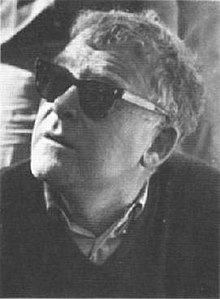Norman Tokar
Norman Tokar | |
|---|---|
 | |
| Born | November 25, 1919 |
| Died | April 6, 1979 (aged 59) Hollywood, California, U.S. |
| Occupation | Film director |
| Years active | 1956–1979 |
Norman Tokar (November 25, 1919 – April 6, 1979) was an American director, actor and occasionally writer and producer of serial television and feature films, who directed many of the early episodes of Leave it to Beaver, and found his greatest success directing over a dozen films for Walt Disney Productions, spanning the 1950s to the 1970s.[1][2]
Career
On Broadway, Tokar acted in Delicate Story (1940), The Life of Reilly (1942), See My Lawyer (1939) and The Magic Touch (1947).[3] After that, Tokar moved into radio, most notably The Aldrich Family, where he played Henry Aldrich's friend Willie[4] and wrote several episodes as well. Tokar then went into television direction on such sitcoms as The Bob Cummings Show and The Donna Reed Show, the drama Naked City, and two episodes of the anthology series Colgate Theatre, and he co-wrote an episode of New Comedy Showcase.
In the early 1960s, Tokar's success working with the juvenile actors on 93 episodes of the TV sitcom Leave it to Beaver encouraged Walt Disney to hire him to direct family features for his studio, which frequently used children in key roles. His first feature film assignment was the Western Big Red (1962), followed by the Old Yeller sequel Savage Sam (1963) and Those Calloways (1965). After directing the Fred MacMurray picture Follow Me, Boys!, and the Dean Jones/Suzanne Pleshette slapstick comedy The Ugly Dachshund (both 1966), Tokar's next directorial assignment (Walt Disney's last before his death) was the roadshow musical The Happiest Millionaire (1967). With a Sherman Brothers score and a cast including Fred MacMurray, Greer Garson, Tommy Steele, Lesley Ann Warren, and John Davidson, the studio hoped the film would do as well with critics and audiences as Mary Poppins (1964) had done. When it failed to do so, the studio cut the nearly three-hour film down to 144 minutes and again to 118 minutes for general release; the cut footage went unseen until it was restored in the 1990s.
Tokar followed Millionaire with more examples of the high-concept comedies that became the mainstay of the studio in the 1960s and 1970s: The Horse in the Gray Flannel Suit (1968), The Boatniks (1970), and Snowball Express (1972). After directing his only non-Disney feature Where the Red Fern Grows (1974), Tokar made his most commercially successful film; the comedy western The Apple Dumpling Gang (1975). Following Candleshoe (1977), on Tokar's final film before his death, The Cat from Outer Space (1978), he gained a co-producer credit.
Death
On April 6, 1979, Tokar died in his sleep at Cedar Sinai in Hollywood, California, following a recent heart attack.[citation needed]
Filmography
| Year | Title |
|---|---|
| 1962 | Big Red |
| 1963 | Savage Sam |
| 1964 | A Tiger Walks |
| 1965 | Those Calloways |
| 1966 | The Ugly Dachshund |
| 1966 | Follow Me, Boys! |
| 1967 | The Happiest Millionaire |
| 1968 | The Horse in the Gray Flannel Suit |
| 1969 | Rascal |
| 1970 | The Boatniks |
| 1972 | Snowball Express |
| 1974 | Where the Red Fern Grows |
| 1975 | The Apple Dumpling Gang |
| 1976 | No Deposit, No Return |
| 1977 | Candleshoe |
| 1978 | The Cat from Outer Space |
References
- ^ Hal Erickson. "Norman Tokar". Movies & TV Dept. The New York Times. Baseline & All Movie Guide. Archived from the original on 2013-02-16.
- ^ Ted Johnson; Sarah M. Brown (September 7, 1989). "Belmont Shore Video Store a Movie Family's Affair". Los Angeles Times.
- ^ "Norman Tokar". Internet Broadway Database. The Broadway League. Archived from the original on February 6, 2020. Retrieved February 6, 2020.
- ^ Terrace, Vincent (1999). Radio Programs, 1924-1984: A Catalog of More Than 1800 Shows. McFarland & Company, Inc. p. 19. ISBN 978-0-7864-4513-4.
External links
- Norman Tokar at IMDb
